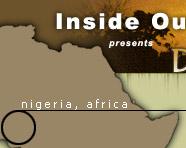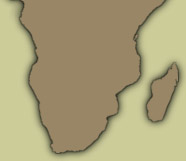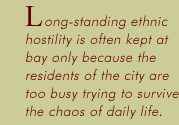




Work Interaction Unlike some cultures where "saving face" is prized above all social interactions, Nigerians like to speak their mind. That's not to say that they are rude, but if there is an issue that is genuinely disturbing them, they will let you know about it. Rather than being a hindrance, this cultural trait was quite refreshing and occasionally helped to raise key topics for discussion at our staff meetings. At a meeting last October, one of our staff asked why MSF hadn't played a more active role in treating wounded and displaced people from a series of riots around Lagos. This question was a departure from the usual hum-drum meeting fare and, more importantly, quite a good question. |
The most credible version of the events surrounding this riot (and the one reported by the international media) was that a group of militant Yoruba youths, claiming to belong to the O'dua People's Congress (OPC), confronted several Hausas and accused them of robbery in one of the largest Lagos slums.The Yoruba and the Hausa are the dominant tribes in the southwest and north of Nigeria respectively. The tension quickly escalated and the Yoruba youths lynched the Hausas. In Lagos, which boasts the most ethnically diverse mix of people in Nigeria, long-standing ethnic hostility is often kept at bay only because the residents of the city are too busy trying to survive the chaos of daily life. However, a single spark can easily set off a series of catastrophic events. And that's what happened in this case.
For the next several days, the densely packed slums of Ajegunle, Apapa, and Amukoko were ablaze as groups of Hausa and Yoruba youth attacked and counter-attacked each other viciously. Homes, cars, and shops were burned. Knife fights, stone fights, and gun fights became a reality. The chaos only stopped when Bola Tinubu, the governor of Lagos state, called a 6 p.m. to 6 a.m. curfew and the president, Olesegun Obasanjo, authorized the use of "all necessary force."
The end result of this rioting was hundreds of dead, thousands wounded, and thousands more displaced from their homes. This was exactly the kind of situation that MSF should have been reacting to, but we didn't.
As the discussion ensued in our staff meeting, we pointed out two reasons for this inactivity- lack of information and the lack of equipment for a medical intervention in Lagos. First, during the chaos of the riots, it was nearly impossible to get a clear idea of the scope of the fighting. And, secondly, our Lagos office was clearly set up to play a supporting role for our medical projects in the north and southeast of the country. But, what the riots had shown us, and what our staff member's questions had highlighted was that there clearly needed to be some capacity for medical interventions in the Lagos area.
The country manager, logistical coordinator, medical coordinator, and myself all sat down to mull over this topic later in the week. We agreed that it was crucial to be able to react to medical crises in the Lagos area, not only for the good of the people who would be put in danger, but also to preserve a general sense of political neutrality between the three dominant tribal regions in the country.
Earlier in the year, our medical coordinator had designed a "crisis" surgical kit which could be used for sporadic ethnic clashes. The contents of this surgical kit were based on the experience of medical interventions in similar ethnic clashes in the north of Nigeria. So, we agreed that a number of these kits should be kept on hand in Lagos to be able to react to future clashes. And, to improve our information-gathering capabilities, we urged our staff to report even the smallest incidents of ethnic violence so we could properly monitor and react in the future.

